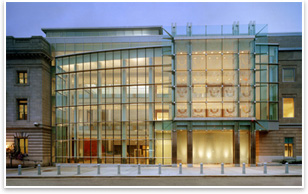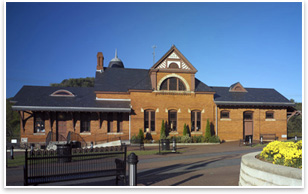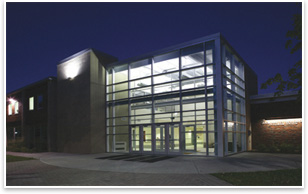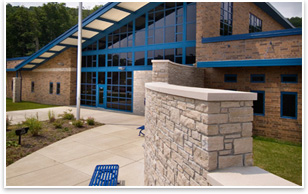AIA
West Virginia Honors Four Projects
Summary: Every
year AIA West Virginia recognizes the most outstanding architecture
design projects within the Mountain State, as well as projects outside
the state that were designed by members of the chapter. This year’s
honored projects numbered four: a federal courthouse and a railroad
station restoration (honor awards recipients), and a student union
and a juvenile center (merit award recipients). To celebrate the
150th national AIA anniversary and AIA West Virginia’s 85th,
the chapter is creating a traveling exhibit of all its past design
award recipients.
Honor Awards
 Project: Federal Building & U.S. District
Courthouse Project: Federal Building & U.S. District
Courthouse
Location: Wheeling, W.Va.
Architect: Joan Goody, FAIA, Goody-Clancy,
Boston
Visually transparent, aesthetically bold, and historically sensitive,
this new courthouse stands as a fresh point of civic pride and purpose
for the citizens of Wheeling. Challenged with designing a building
that would revitalize the downtown and honor an adjacent Beaux Arts
court building—even as it looks to the future—the architects
drew on the city’s history; its glassmaking traditions; and
the proportions, massing, and materials of the surrounding context
to craft a strikingly Modern architectural presence. The dramatic
glass entry portico sets the stage for a sunlight-filled central
lobby and elegant grand stair where the public can gather, and around
which all public spaces and courtrooms organize.
Photo © Anton Grassl.
 Project: B&O Railroad Station Restoration Project: B&O Railroad Station Restoration
Location: Oakland, Md.
Architect: Schamu Machowski Greco Architects, Wheeling, W.Va.
The restoration of the historic 1884 Baltimore & Ohio Railroad
Station in Oakland, Md., supplied a key ingredient to the Town of
Oakland’s revitalization project, which also includes a hiking/biking
trail, town park, farmer’s market, community pavilion, and
boat/fishing ramp complex. Designed in 1884 by Baldwin and Pennington,
the Baltimore and Ohio Railroad Station is one of the country’s
most distinguished depots, having played host to Presidents Grant,
Harrison, Cleveland, and McKinley—as well as Buffalo Bill Cody.
Listed on the National Register of Historic Places, the building
now serves as the Oakland Visitors’ Center and houses a theater
and model train display.
Photo © Alain Jaramillo, Baltimore.
Merit Awards
 Project: James C. Wilson Student Union additions and alterations,
West Virginia State University Project: James C. Wilson Student Union additions and alterations,
West Virginia State University
Location: Institute, W.Va.
Architect: Silling Associates Charleston, W. Va.
The architect created additions and alternations to this student
union to present an appropriate front porch to the dominant commuter
segment of the student body, enhance the connection to the formal
campus center from its parking zones, and create many opportunities
for student activities and services within the facility. The result
is a truly diverse yet cooperative organization of functional spaces
that enhances the university’s ability to serve the modern
student. By providing a broader spectrum of spaces and services,
the student union aspires to again become the center for social activity
and anchor for a rich college experience.
Photo © Ferrel Photographics.
 Project: Gene Spadaro Juvenile Center Project: Gene Spadaro Juvenile Center
Location: Mt. Hope, W.Va.
Architect: Michael Henley, ZMM Inc., Charleston, W.Va.
The architect adapted their prototype design to make this center
the latest in a series of regional juvenile facilities they have
designed for the state. By eliminating the lockdown environment of
a full-fledged correctional center, the 28,500-square-foot facility
is designed to qualify for federal funding that assists with housing
for children at risk. The shift to staff-secured operation requires
even greater levels of observation, communication, and control, which ZMM achieved through design of an open layout. The $4.7 million
center can accommodate up to 23 youths at a time, with spaces dedicated
to education, dining, physical fitness, administration, and control/observation.
The facility features innovative color schemes and abundant natural
lighting to support its treatment-focused programming.
Photo © Rick Lee.
|


 Project:
Project: Project:
Project: Project:
Project: Project:
Project: